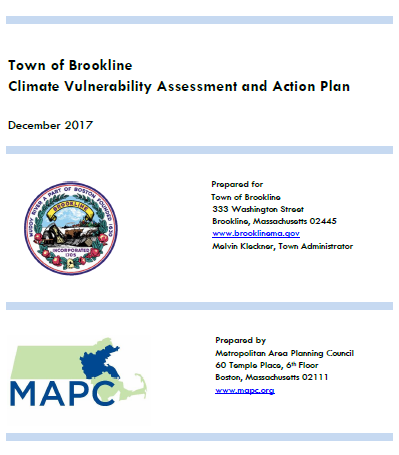December 2017 Climate Vulnerability Assessment and Action Plan
Prepared for the Town of Brookline by the Metropolitan Area Planning Council
The devastating effects of Hurricanes Harvey, Irma, and Maria highlight the imperative to plan now for future storms. As detailed in the Climate Change Background section of this report, we are already experiencing warmer temperatures, increased precipitation, and rising seas. Climate projections for this century include increased frequency and intensity of rain storms, and more frequent days with extreme heat.
Heat can cause serious illnesses and it was the leading cause of weather fatalities in the United States over the past decade (EPA). The analysis of land surface temperatures in this report finds that much of north Brookline is likely to be particularly affected by high heat due to the “heat island effect” where areas with less greenery and more pavement experience higher temperatures. A significant portion of north Brookline is within the hottest 5% of land area in the 101-municipality MAPC region. North Brookline also includes a high proportion of individuals likely to be vulnerable to extreme heat, including individuals over 65 and individuals living alone.
Precipitation in the Boston area has increased by 10% in the past fifty years. Recently released design storm figures (NOAA 14) for the 10-year, 24-hour storm are 15% higher than those issued in 1961. As a result, the 24-hour 100-year design storm of 1961 is roughly equivalent to a 30-year design storm today. The 1996 rainstorm that flooded the Muddy River and Kenmore Station and caused millions of dollars in damages is roughly equivalent to a fifty-year event (NOAA 14). It will be a challenge for town stormwater infrastructure to keep pace with increased rain events. A one-thousand year event would double the rainfall experienced in 1996. As is evident from the recent hurricanes, damage and suffering from such extreme events is inevitable. Indeed, flooding or extreme heat, and the resultant potential for power outages can have severe and cascading effects during far lesser storms than a one-in-one-thousand year occurrence.
Yet we can take steps to increase community resilience and limit future damages. Many of today’s municipal investments and decisions will have long legacies that will influence future vulnerabilities. Advance planning can save money, while inaction, or actions that don’t anticipate future conditions, may lead to higher costs in the future. An example of effective planning comes from the reports that Florida properties experienced much less damage from Hurricane Irma than from Hurricane Andrew in 1992. This is attributed to critical improvements made to the building code as a result of lessons learned from Hurricane Andrew. This report identifies future climate vulnerabilities and suggests strategies that can reduce the risk of harm to people and properties, and help speed recovery when inevitable future storms occur.
Project Manager/Senior Environmental Planner
Anne Herbst
Regional Planner
Genea Foster
GIS/Data Analysis
Eliza Wallace
Ryan Melendez
Emily Long
Acknowledgements
The project was conducted by the Metropolitan Area Planning Council (MAPC) with funding from MAPC’s Planning for MetroFuture Technical Assistance program, the Barr Foundation, and the Commonwealth of Massachusetts Community Compact program.
This report incorporates analysis of urban heat islands in Brookline provided by the Sustainability and Data Sciences Lab (SDS) of Northeastern University led by Dr. Auroop Ganguly, which was made possible through a partnership with the American Geophysical Union Thriving Earth Exchange Program.
Town of Brookline:
- Select Board Chair Neil Wishinsky
- Select Board Co-Chair Nancy Heller
- Select Board Co-Chair Werner Lohe
- Town Administrator Melvin Kleckner
- Director of Planning and Community Development Alison C. Steinfeld
- Senior Planner, Climate Action/Lane Use Maria Morelli
Steering Committee Members: Daniel Bennett, Michael Berger, Tom Brady, Kara Brewton, Peter Ditto, Keith Flaherty, Erin Gallentine, Melissa Goff, Michael Groopman, John Harris, Swannie Jett, Todd Kirrane, Maria Morelli, Daniel O’Leary, David Pantalone, Deborah Rivers, Frederick Russell, Kevin Stokes

